 Today the FCC voted to classify broadband internet (including mobile internet) as a telecommunication service, with internet now regulated the same way that voice networks have been - with providers classified as "common carriers" under Title II of the 1934 Telecommunications Act.
Today the FCC voted to classify broadband internet (including mobile internet) as a telecommunication service, with internet now regulated the same way that voice networks have been - with providers classified as "common carriers" under Title II of the 1934 Telecommunications Act.
The new rules will ban paid prioritization, and the blocking or throttling of any lawful content or services.
In other words - the core network needs to be neutral, and treat all traffic equally. Internet providers will no longer be allowed to give preferential fast lanes to partners, nor punish competitors (like Netflix) by throttling speeds so that the service becomes unusable.
This is a major victory for network neutrality advocates, who rallied millions of supporters to fight for an "open Internet" in response to the FCC's request for comments.
And this is a huge loss for some of the big internet providers - including the cellular and cable companies. It is a particularly stinging loss for Verizon, who has been fighting ferociously to avoid regulation.
The "Net Neutrality" issue is a complex one. Both sides are prone to oversimplification, and overblown fear mongering about how bad things will get if they lose the fight. In a nutshell, the case for each side...
- The Case In Favor: The Internet is built on openness and a long tradition of network neutrality, and services like Netflix or YouTube or even Google might never have been possible if the network providers were acting as gatekeepers. Letting internet providers block or throttle certain services in favor of ones which have paid for exclusive access to customers, or a special "fast lane", will destroy the internet as we know it, eliminating the level playing field that has made the Internet such an engine for innovation. Without the protection of network neutrality, new companies and services will never be able to reach critical mass, and only the biggest companies will be able to afford to pay for access.
- The Case Against: The government has no business interfering with the business agreements that internet providers enter into, and doing so violates the first amendment rights of the carriers. The worries of what might happen without regulation are overblown - the FCC stepping in to enforce net neutrality is the start of a slippery slope that will lead to the government sucking all the innovation and profit out of the telecommunications industry. Investment in faster network speeds and increased coverage will dry up. And eventually... this will all just inevitably lead to more taxes, and even more regulation.
In general, most internet and tech companies (large and small) have been in favor of net neutrality. And most cable TV and telecom companies have been against it.
Table of Contents
Who Started The Fight? Why Now?
The Internet has always operated on the principle of net neutrality - so what made this into such a hot issue? What prompted the panic that things might so drastically change?
It all comes down to the cable companies freaking out over Netflix.
Netflix has grown to be responsible for 35% of US Internet traffic, and as increasing numbers of people use services like Netflix to get their TV fix, more and more people are willing to cut the cord and cancel or scale back their cable TV subscriptions.
In response - the cable companies (which also provide Internet service to many of their customers) began exploring ways to slow down the growth of Netflix and other video streaming traffic to make online video less appealing.
That was the start of the slippery slope - because once you open the door to favoring one type of content and penalizing another, it becomes very tempting to sell access to "fast lanes" to partners, and even to offer "exclusives" that would block competitors, or redirect from one service to another.
A lot of the business models being discussed were starting to reshape the Internet to look more like Cable TV - with content, channels, and packages controlled by the internet provider, not by what consumers chose freely by openly surfing or installing apps.
And the fear of living with an Internet dictated by companies like Comcast is what started the freakout by the denizens of the online world.
The Netflix vs cable TV battle opened the Pandora's box - and the public debate spilled out to become a fight for the future of the entire Internet - or at least that is how both sides started to paint the issue.
The Fox... Defending The Hen House?
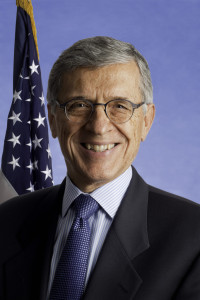
When Tom Wheeler, a former telecom industry lobbyist, was appointed as the Chairman of the FCC in 2013, a lot of net neutrality supporters feared that this was the end of the fight.
Many described putting him in charge of the FCC as "hiring a fox to guard the hen house".
But it turns out, Tom Wheeler has personal experience that shaped his views on openness:
I personally learned the importance of open networks the hard way. In the mid-1980s I was president of a startup, NABU: The Home Computer Network. My company was using new technology to deliver high-speed data to home computers over cable television lines. Across town Steve Case was starting what became AOL. NABU was delivering service at the then-blazing speed of 1.5 megabits per second—hundreds of times faster than Case’s company. “We used to worry about you a lot,” Case told me years later.
But NABU went broke while AOL became very successful. Why that is highlights the fundamental problem with allowing networks to act as gatekeepers.
While delivering better service, NABU had to depend on cable television operators granting access to their systems. Steve Case was not only a brilliant entrepreneur, but he also had access to an unlimited number of customers nationwide who only had to attach a modem to their phone line to receive his service. The phone network was open whereas the cable networks were closed. End of story.
...
The internet must be fast, fair and open. That is the message I’ve heard from consumers and innovators across this nation. That is the principle that has enabled the internet to become an unprecedented platform for innovation and human expression. And that is the lesson I learned heading a tech startup at the dawn of the internet age. The proposal I present to the commission will ensure the internet remains open, now and in the future, for all Americans.
The new rules were voted on today, but only the five page summary of the full ruling has so far been published. Once the full rules are published by the FCC, they will go into effect in 60 days.
Verizon Throws a Tantrum, Likely To Fight On
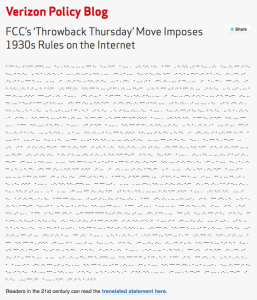
In response to the FCC's ruling, Verizon issued a press release in Morse code - harkening back to the 1934 era rules that the FCC is now imposing on them:
"Today (Feb. 26) the Federal Communications Commission approved an order urged by President Obama that imposes rules on broadband Internet services that were written in the era of the steam locomotive and the telegraph...."
Or as one commenter on Ars said:
"You know you're doing something right when you can get a large corporation to throw a tantrum like a wee toddler. What's next Verizon? Throw your toys out of the pram? Lovely."
The FCC had initially hoped to strike a middle ground, introducing some regulations in 2010 without invoking a full Title II reclassification.
These earlier rules only applied to wired internet, and did not apply to wireless at all.
But Verizon fought the rules, and won a lawsuit against the FCC on the grounds that the FCC had no standing to regulate Internet service that did not fall under the telecommunications act - tossing those earlier rules out the window.
But the court made clear that the FCC was within its mandate to reclassify Internet services under the older Title II rules, leaving the FCC only one path forward.
So... In a sense, Verizon fought too hard against the weaker rules and forced the FCC's hand to use what some called the "nuclear option" - reclassifying internet service to be regulated the same way that voice networks have been.
But the fight isn't over yet... Verizon has made it clear that they will continue to fight the new regulations, and AT&T has already previewed the justification they will use in court when they file their lawsuit in response.
And of course, congress or a future administration may change things yet again.
Implications for Mobile Internet & RVers
It is very hard to say just how these new rules will shake out - particularly since the full details have yet to be published, or hashed out in court.
Carriers will still be allowed to manage their network, which means that limitations on speeds and usage will be allowed. But they must be managing their network treating users and traffic fairly, not for commercial gain prioritizing some traffic over others.
The FCC explicitly clarifies:
However, the network practice must be primarily used for and tailored to achieving a legitimate network management—and not commercial—purpose. For example, a provider can’t cite reasonable network management to justify reneging on its promise to supply a customer with “unlimited” data.
Grandfathered unlimited data plans will thus probably cease to be at risk of being throttled - a boon for those who have them.
With more active FCC oversight - roaming rates the carriers charge each other will potentially go way down too, eventually letting smaller and regional carriers become better able to offer nationwide coverage that rivals the big two.
Carriers will probably have less ability to limit tethering too, and they might not be able to block you moving service between phones and tablets and hotspots by swapping SIM cards around.
But some services - like T-Mobile's free unlimited music streaming, may be found to be taking advantage of unfair prioritization. If you can't treat a music stream different than video or a website, T-Mobile may be forced to drop this perk.
Other things - like sponsored sites that don't count against your monthly usage - are probably going to have to be rethought as well. Carriers will not be able to offer exclusive subscriber-only perks like streaming sports games, or behind the scenes video.
This means we will not see things like cheap sponsored phone plans that give unlimited access to Facebook, for example. Or plans with unlimited data, but blocked video streaming.
With the FCC taking such an active role - carriers are going to be on their best behavior around consumer complaints, since the FCC now has the authority to act in response to them too.
It will be very interesting to see how this plays out.
Further Reading:
This is indeed a very complicated issue. Here are a few good articles on the subject, if you'd like to know more.
- Ars Technica - FCC votes for net neutrality, a ban on paid fast lanes, and Title II
- CNET - Net neutrality a reality: FCC votes to bring Internet under utility-style rules
- CNET - Net Fix: 8 burning questions about Net neutrality
- Ars Technica - AT&T previews lawsuit it plans to file against FCC over net neutrality
- CNET - Comcast vs. Netflix: Is this really about Net neutrality?
- IEEE - Net Neutrality's Technical Troubles
UPDATE: The full ruling has now been published by the FCC, and can be read here (583 page PDF - beware!) for those interested in the deep details. As the actual implementation impacts are slowly worked out, we will be sure to cover everything relevant to RVers here on the RV Mobile Internet Resource Center.
NOTE: Comments that are focused on the politics of this issue are not appropriate here, and will be deleted. We are eager to hear your thoughts on how the changes are likely to impact mobile internet users however.
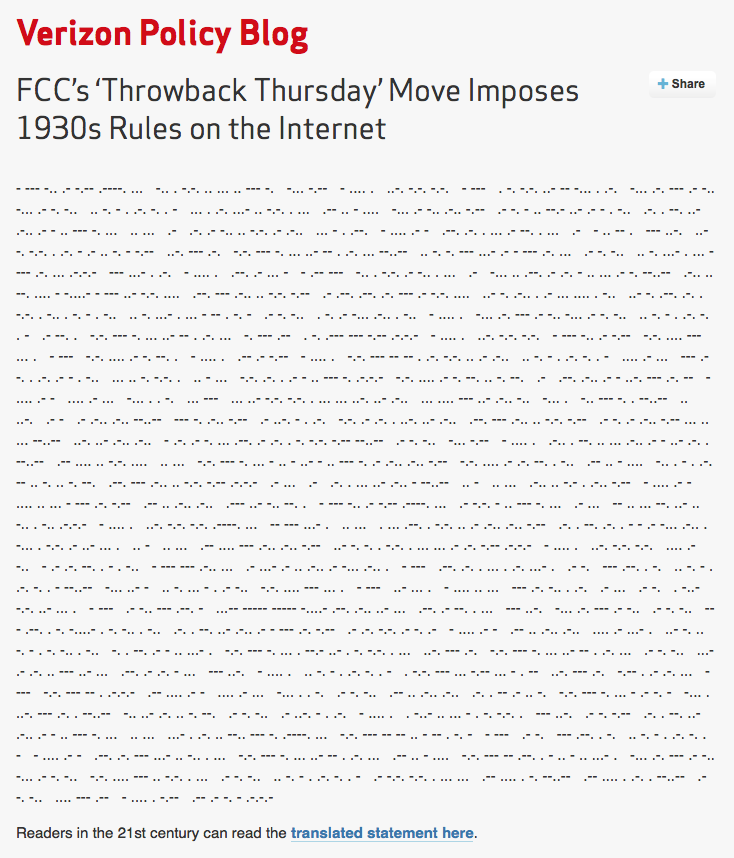
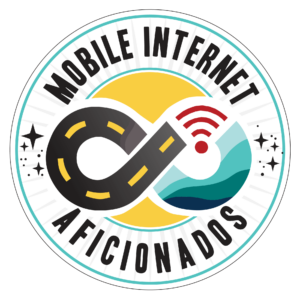




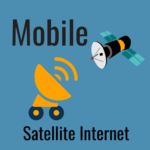

 Mobile Internet Resource Center (dba Two Steps Beyond LLC) is founded by Chris & Cherie of
Mobile Internet Resource Center (dba Two Steps Beyond LLC) is founded by Chris & Cherie of